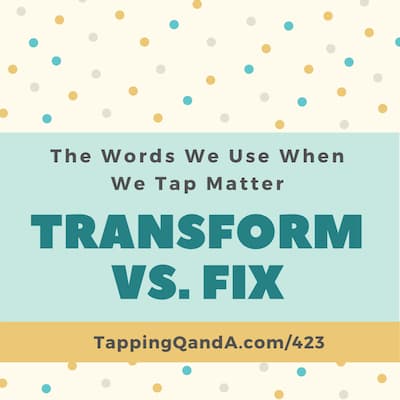 When I am working with clients I pay particular attention to the words they use to describe what they are experiencing. That's because more often than not our emotional response is informed by how we describe what is going on, rather than what is actually going on.
When I am working with clients I pay particular attention to the words they use to describe what they are experiencing. That's because more often than not our emotional response is informed by how we describe what is going on, rather than what is actually going on.
To that end I have created a number of resources to help you decode the language you (or your clients) are using.
In this audio, you will hear me working with one of my clients as we discuss the difference between and “fix” and “transform” and how each of those words impacts the healing process.
An audio transcript can be found below the player.
Subscribe in: Apple | iPhone | Android | Google | Spotify | Pandora
Sue: Could you repeat that thought again? That was really profound…the difference between fix and transform.
Gene: We so often say “I need to fix something” and for anything that we wish to “fix” we’re implying a sense of brokenness. It becomes a state that we're in that can have a lot of negative charge around it.
The first time the power of words in healing was pointed out to me was by my friend Dan Cleary. Something had come up when we were supposed to do an interview, so I had to reschedule. I sent him a note saying “I’m sorry”. He replied saying “Don’t say you're sorry! That's a really profound statement because it's not an apology. It's a statement of the type of thing that I am, “‘Oh that poor, sorry Gene.'”
Being able to recognize I apologize for what happened and it won't happen again is really different from saying “I’m sorry”. When we look at the work we need to do in terms of fixing something about ourselves, or the environment, or the world, it automatically implies something's broken.
Things aren’t necessarily broken. They may not be functioning optimally and they might not be functioning in a way that's healthy and beneficial in the short and long term, but everything we do is functional even if it is not achieving the function that we desire.
I have found it more useful in my own work to think in terms of transformation. I want to transform this from the way it's functioning now to a healthier way, both in the short and long term, so it makes it easier for me to approach the work I need to do. It helps me to shape my mind so I approach it with a better attitude to ensure that I’m doing better work for myself.
Sue: It also sounds more open-ended. When you fix something it feels like you have a definite aim in mind, whereas transformation has a sense of allowing and expansiveness.
Gene: Absolutely. Anytime we are thinking of fixing or broken, we immediately make problems binary. By binary I mean on or off, it's there or it's not. And many situations are more complex than that, they aren't just on or off.
For example, it's not that I don’t feel pain OR I do feel pain. There are gradations of pain and those gradations of pain impact the way I interact in the world. If I have a pain that's a 9 on a scale of 0-10, and I move the pain down to a 6 but my goal is to get rid of the pain, then I have failed. Even though I feel better, I am still hurt.
Moving from a 9 to a 6 on the SUDs scale doesn't mean I have achieved a complete transformation. That is, my pain is not fixed, BUT that reduction might allow me to leave the house for two hours, which I couldn’t do before because I have restored full mobility. That's a big difference and real success. Yes, I still feel pain but I’m able to do things I couldn’t do before. I am moving away from this sense of one way or another, with no shades of grey. Transformation helps us to understand that there are grades of experience, rather than I have them or I don’t.
For many of the things I want to improve in my life I might not ever reach perfection, and if I’m only satisfied with perfect, then I’ll never feel satisfied.
Sue: Wow, that kind of goes along with your “is there something better to…”
Gene: Absolutely yeah, the other part of it is when we make it binary we limit our possibilities and we could actually have something better than whatever we think “fixed” is.
I love this dialogue. It fits perfectly with our present COVID situation. We’re all learning how to do things differently to adjust to our changing—and open-endedly unknown—situation. Buying and preparing food is one thing I am confronting that, it turns out, has a learning curve. What do I need? How much do I need to feel “safe” going forward? How much food to prepare at a time (ie, how many leftovers do I want in my limited storage space)? Many questions like this relate to this time in our lives. So this is a very relevant and kind conversation. Thank you.